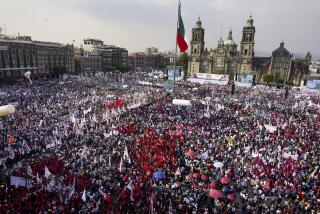Old-Style Politics Returns in New Philippine Election
- Share via
The new politics of the Philippines is looking increasingly like the old politics. The election campaign that will culminate in balloting for Congress on Monday threatens to revive the tawdry tradition of “guns, goons and gold”--the elitist, crony, non-issue politics that found its apogee in the rule of Ferdinand E. Marcos and provoked peasants, their misery ignored, to turn to Communist guerrillas for a way out.
There are about 1,000 candidates from 77 parties competing for 24 Senate and 200 House seats, but the real contest is between a pro-Aquino alliance and the opposition parties of former Marcos officials and supporters. With so many candidates, a lot of money is needed to pay for the publicity necessary to gain name recognition, much less approval. A race for the Senate, with nationwide districts, is priced at $600,000.
Most candidates from both the pro-administration and erstwhile pro-Marcos sides are wealthy veterans of politics--landowners, businessmen and lawyers. Many are from families that ruled for so long that the streets and parks in their hometowns are named for their fathers and grandfathers.
President Corazon Aquino knows about that kind of politics because her late husband, Benigno S. Jr., was deeply involved in it. She refused to form her own political party precisely because she thought politics immoral and divisive and wanted to be above it. She thought that she could get around the problem simply by endorsing individuals. But they have their own agendas, running from social democratic left to conservative Catholic right.
The race is not being run on issues at all, but as a popularity contest banking on Aquino’s charisma. It is her face that dominates the newspaper ads and flyers for a 24-person slate of Senate candidates drawn from the pro-Aquino parties. Voters can’t be sure how her candidates stand on crucial questions like land reform, settlement of the insurgency, the future of U.S. bases, and the new problem raised by the emergence of rightist vigilante groups.
Even worse, the principles and ethics of some of her candidates are questionable. Some were former Marcos politicians, chosen because they still have local political clout. Two were cabinet ministers whom Aquino fired after widespread reports of their corruption. The campaign publicity for one of them says that he was the first to comfort her in Boston after the death of her husband. Her personal gratitude appears to have overtaken political judgment.
The Aquino slate is expected to win the Senate, but it might be a Pyrrhic victory. Neptali Gonzales, her former justice minister and a Senate candidate, said that Aquino wouldn’t be able to control the Senate even if her entire ticket won; her candidates’ commitment is not to Aquino or to a political program but to themselves.
The opposition has a greater chance in elections for the House because of divisions in the pro-Aquino alliance. In one case Luis Villafuerte, governor of Camarines Sur and a former Aquino cabinet minister, defied her by choosing his own candidates over former anti-Marcos legislators whom the alliance had agreed to support in his provincial base. Vice President Salvador Laurel, whose hostility to several liberal parties associated with Aquino caused conflict from the start of the campaign against Marcos, is also running his own Unido Party candidates against the Aquino congressional choices.
Another element from the past, election violence, has been revived with the killing of at least three dozen candidates and campaigners. Several leftist candidates who turned up murdered had been last seen in the company of military police. Their “People’s Party,” including several prominent Communists, has been pushed by leftists who want to try a parliamentary route against the view of hard-line Communists who are determined to prosecute the war. So far they are not having a very good experience with democracy.
Candidates, in the old tradition, are buying votes, and some registrations had to be annulled because of “flying registrants”--teams of would-be voters seeking to sign up at several precincts. Some towns have been put under the control of the Commission on Elections in an attempt to forestall wholesale fraud.
The heavy hand of the administration in power is unfortunately still evident, too. Jaime Ferrer, the local governments secretary, attempted to fire some local officials because they didn’t support Aquino candidates, but the Supreme Court stayed the action. He later said that he wanted them out because of “graft and corruption.”
Aquino was successful in leading the political campaign against Marcos that set the stage for his ouster, but she has not shown the strong leadership necessary to reform the country’s politics. Bringing back the pre-Marcos style of politics is no great step forward for democracy.
More to Read
Sign up for Essential California
The most important California stories and recommendations in your inbox every morning.
You may occasionally receive promotional content from the Los Angeles Times.













